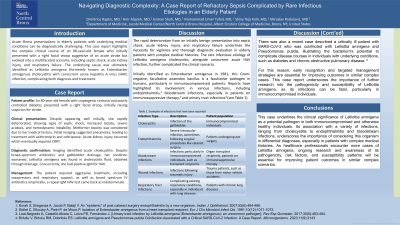Monday Poster Session
Category: Liver
P3150 - Navigating Diagnostic Complexity: A Case Report of Refractory Sepsis Complicated by Rare Infectious Etiologies in an Elderly Patient
Monday, October 28, 2024
10:30 AM - 4:00 PM ET
Location: Exhibit Hall E

Has Audio
- DR
Dimitrios Raptis, MD
NYC Health + Hospitals/Jacobi
Bronx, NY
Presenting Author(s)
Dimitrios Raptis, MD1, Amr Aljareh, MD1, Usman Shah, MBBS2, Muhammmad Tufail, MD1, Shiny Teja Kolli, MD3
1NYC Health + Hospitals/Jacobi, Bronx, NY; 2North Central Bronx Hospital, Bronx, NY; 3Jacobi Medical Center/North Central Bronx Hospital, Bronx, NY
Introduction: Acute illness presentations in elderly patients with underlying medical conditions can be diagnostically challenging. This case report highlights the complex clinical course of an 80-year-old female who initially presented with a right facial droop suggestive of an acute stroke but evolved into a multifaceted scenario, including septic shock, acute kidney injury, and respiratory failure. The underlying cause was ultimately identified as Enterobacter amnigena cholecystitis with concurrent acute hepatitis A virus (HAV) infection, complicating both diagnosis and treatment.
Case Description/Methods: An 80-year-old female with cryptogenic cirrhosis and poorly controlled diabetes presented with a right facial droop, initially raising suspicion for stroke. Despite appearing well initially, she rapidly deteriorated, showing signs of septic shock, increased lactate, severe acidosis, and hemodynamic instability. Metformin toxicity was considered due to her medical history. Initial imaging suggested pneumonia, leading to treatment with azithromycin and ceftriaxone. Acute kidney injury required CRRT. Imaging identified acute cholecystitis. Despite broad-spectrum antibiotics and gallbladder drainage, her condition worsened. Enterobacter amnigena (now Lelliottia amnigena) was found in cholecystitis fluid. Concurrently, she had positive IgM for HAV. Despite aggressive treatment, including vasopressors and respiratory support, she did not survive. Autopsy confirmed refractory sepsis due to Lelliottia amnigena cholecystitis, with an indeterminate repeat IgM HAV test on the day of death. The case highlights the complexity of managing sepsis with multiple comorbidities and the need for rapid, accurate diagnosis.
Discussion: This case illustrates the diagnostic and therapeutic challenges posed by the interplay of acute illnesses and underlying medical conditions. The rapid deterioration of an initially benign presentation into septic shock, acute kidney injury, and respiratory failure highlights the need for vigilance and comprehensive diagnostic evaluation in elderly patients with complex medical histories. The rare infectious etiology of Lelliottia amnigena cholecystitis and concurrent acute HAV infection further complicated the clinical scenario, emphasizing the importance of considering unusual pathogens and co-infections in critically ill patients. Early recognition and targeted management strategies are crucial for improving outcomes in similar complex cases.
Disclosures:
Dimitrios Raptis, MD1, Amr Aljareh, MD1, Usman Shah, MBBS2, Muhammmad Tufail, MD1, Shiny Teja Kolli, MD3. P3150 - Navigating Diagnostic Complexity: A Case Report of Refractory Sepsis Complicated by Rare Infectious Etiologies in an Elderly Patient, ACG 2024 Annual Scientific Meeting Abstracts. Philadelphia, PA: American College of Gastroenterology.
1NYC Health + Hospitals/Jacobi, Bronx, NY; 2North Central Bronx Hospital, Bronx, NY; 3Jacobi Medical Center/North Central Bronx Hospital, Bronx, NY
Introduction: Acute illness presentations in elderly patients with underlying medical conditions can be diagnostically challenging. This case report highlights the complex clinical course of an 80-year-old female who initially presented with a right facial droop suggestive of an acute stroke but evolved into a multifaceted scenario, including septic shock, acute kidney injury, and respiratory failure. The underlying cause was ultimately identified as Enterobacter amnigena cholecystitis with concurrent acute hepatitis A virus (HAV) infection, complicating both diagnosis and treatment.
Case Description/Methods: An 80-year-old female with cryptogenic cirrhosis and poorly controlled diabetes presented with a right facial droop, initially raising suspicion for stroke. Despite appearing well initially, she rapidly deteriorated, showing signs of septic shock, increased lactate, severe acidosis, and hemodynamic instability. Metformin toxicity was considered due to her medical history. Initial imaging suggested pneumonia, leading to treatment with azithromycin and ceftriaxone. Acute kidney injury required CRRT. Imaging identified acute cholecystitis. Despite broad-spectrum antibiotics and gallbladder drainage, her condition worsened. Enterobacter amnigena (now Lelliottia amnigena) was found in cholecystitis fluid. Concurrently, she had positive IgM for HAV. Despite aggressive treatment, including vasopressors and respiratory support, she did not survive. Autopsy confirmed refractory sepsis due to Lelliottia amnigena cholecystitis, with an indeterminate repeat IgM HAV test on the day of death. The case highlights the complexity of managing sepsis with multiple comorbidities and the need for rapid, accurate diagnosis.
Discussion: This case illustrates the diagnostic and therapeutic challenges posed by the interplay of acute illnesses and underlying medical conditions. The rapid deterioration of an initially benign presentation into septic shock, acute kidney injury, and respiratory failure highlights the need for vigilance and comprehensive diagnostic evaluation in elderly patients with complex medical histories. The rare infectious etiology of Lelliottia amnigena cholecystitis and concurrent acute HAV infection further complicated the clinical scenario, emphasizing the importance of considering unusual pathogens and co-infections in critically ill patients. Early recognition and targeted management strategies are crucial for improving outcomes in similar complex cases.
Disclosures:
Dimitrios Raptis indicated no relevant financial relationships.
Amr Aljareh indicated no relevant financial relationships.
Usman Shah indicated no relevant financial relationships.
Muhammmad Tufail indicated no relevant financial relationships.
Shiny Teja Kolli indicated no relevant financial relationships.
Dimitrios Raptis, MD1, Amr Aljareh, MD1, Usman Shah, MBBS2, Muhammmad Tufail, MD1, Shiny Teja Kolli, MD3. P3150 - Navigating Diagnostic Complexity: A Case Report of Refractory Sepsis Complicated by Rare Infectious Etiologies in an Elderly Patient, ACG 2024 Annual Scientific Meeting Abstracts. Philadelphia, PA: American College of Gastroenterology.
